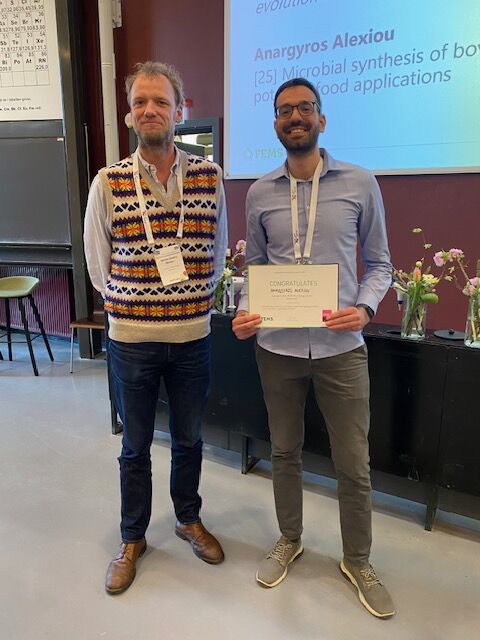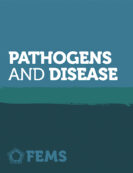FEMS Microbiology Letters Poster Prize: Anargyros Alexiou
We send our congratulations to Anargyros Alexiou, who won the best poster prize at the International Conference on Microbial Food and Feed Ingredients (MiFFi), sponsored by FEMS Microbiology Letters.
 The MiFFi conference took place on 19-21 April 2023 in Copenhagen, Denmark. This meeting is associated with a Thematic Issue in FEMS Microbiology Letters in which non-attendees are also welcome to submit. You can find more details about this call here.
The MiFFi conference took place on 19-21 April 2023 in Copenhagen, Denmark. This meeting is associated with a Thematic Issue in FEMS Microbiology Letters in which non-attendees are also welcome to submit. You can find more details about this call here.
Read our interview with Anargyros about his research below:
What is your current position, and what was your scientific journey to get there?
I am currently a first-year PhD student in the Strain Design Teams and Bacterial Signal Transduction group within the Novo Nordisk Foundation Center for Biosustainability (DTU Biosustain) in Denmark.
Before this, I obtained my bachelor’s degree in Biological Sciences from the Department of Biology at the University of Patras. To complete my bachelor’s thesis, I joined the RNA biology group in the medical faculty of the same university. That experience sparked my scientific interest, and I decided to continue my journey in the same group by entering the master’s program in Biomedical Sciences.
During my master’s thesis, I gained a comprehensive understanding of RNA, its biological significance, and its potential applications. This exposure introduced me to the previously unknown field of synthetic biology. After obtaining my master’s degree, I actively sought positions within synthetic biology, and I was pleased to be accepted at DTU Biosustain, initially as an Erasmus+ Trainee and later as a PhD student.”
Could you describe the research your poster covered?
The poster presented in the 3rd International Conference on Microbial Food & Feed Ingredients (MiFFi 2023) covered the microbial synthesis of bovine gelatin/collagen in B. subtilis. In other words, we seek to heterologously produce collagen, or its derivative gelatin, through the use of synthetic biology tools and the bacterium B. subtilis as a host for downstream precision fermentation.
Collagen is a polymeric protein with unique functional properties, such as high water-binding capacity and gel-forming abilities, making it a popular ingredient in the food, pharmaceutical, and biomedical industries. Traditionally, collagen has been obtained from animal sources. However, animal agriculture contributes significantly to greenhouse gas emissions, particularly methane and nitrous oxide, which have longer atmospheric lifespans than carbon dioxide. Transitioning from traditional livestock farming to plant- or fermentation-based processes can make a substantial contribution to mitigating global warming. Additionally, animal-derived collagen poses the risks of infectious disease, low end-product reproducibility and ethical concerns.
Microbial cell factories offer a promising alternative for sustainable, safe and standardized collagen production. In my poster, we presented preliminary results indicating that Bacillus subtilis, a bacterium well-known for its ability to secrete high levels of recombinant proteins, has the potential to successfully produce collagen peptides. Furthermore, by testing 32 different secretion peptides we showed that the efficiency of protein secretion depends greatly on interplay between the secretion tag and protein sequence and picked the best candidates.”
What do you hope to focus your research on in the future?
For my current PhD project, I would focus on unveiling the stress responses that limit protein production using transcriptomics data analysis. I will continue with further strain optimization to alleviate these stress responses. Furthermore, I will also test collagen and other polymeric protein products and explore their potential in food and material applications as a proof of concept.
As I am a curiosity-driven person, after my PhD, I would like to continue my scientific journey and leverage my RNA, biomedical and synthetic biology backgrounds to contribute to the development of technologies that promote a healthier and more sustainable world.”
–
We use income from the FEMS Journals to fund grants, awards, and projects, and to support our knowledge sharing events and initiatives. Consider publishing your research with our journals to help the global microbiology community.
All but one of the FEMS journals are fully open access (OA), with one journal, FEMS Microbiology Letters, offering free-to-publish and OA options. Open access is key to supporting the FEMS mission of disseminating high quality research as widely as possible: when high quality, peer reviewed sound science is open access, anyone, anywhere in the world with an internet connection, can read it.







